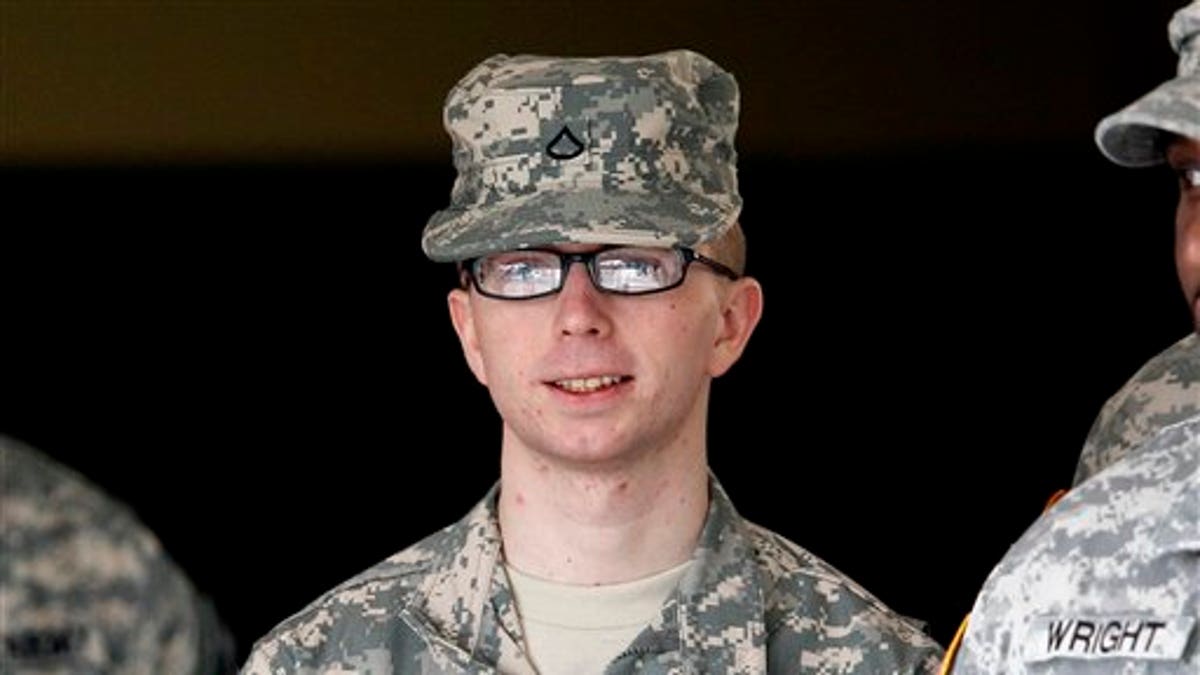
Dec. 22, 2011: Army Pfc. Bradley Manning is escorted from a courthouse in Fort Meade, Md. (AP)
WASHINGTON – An Army officer recommended a general court-martial Thursday for a low-ranking intelligence analyst charged with causing the biggest leak of classified information in U.S. history.
Lt. Col. Paul Almanza's recommendation to try Pfc. Bradley Manning on all 22 counts, including aiding the enemy, now goes up the chain of command for a final determination. Almanza sent his report to Col. Carl Coffman, garrison commander of Joint Base Myer-Henderson Hall near Washington. Coffman will make a recommendation to Military District of Washington commander Maj. Gen. Michael Linnington, whose decision is final.
The military did not provide a timeline for those actions.
Manning, a 24-year-old native of Crescent, Okla., allegedly gave more than 700,000 secret U.S. documents to the anti-secrecy website WikiLeaks for publication. Prosecutors say WikiLeaks founder Julian Assange collaborated with Manning.
Defense lawyers say Manning was clearly a troubled young soldier whom the Army should never have deployed to Iraq or given access to classified material while he was stationed there from late 2009 to mid-2010.
Manning could be imprisoned for life if convicted of the aiding the enemy, the most serious charge. The charge carries a maximum penalty of death, but Almanza agreed with prosecutors, who recommended against seeking the death penalty. Ultimately, however, that decision lies with Linnington.
Almanza presided over Manning's seven-day preliminary hearing, called an Article 32 investigation, in December at Fort Meade, Md. During that hearing, military prosecutors produced evidence that Manning downloaded and electronically transferred to WikiLeaks nearly half a million sensitive battlefield reports from Iraq and Afghanistan, hundreds of thousands of diplomatic cables, and video of a deadly 2007 Army helicopter attack that WikiLeaks shared with the world and dubbed "Collateral Murder."
Manning's lawyers countered that others had access to Manning's workplace computers. They say he was in emotional turmoil, partly because he was a gay soldier at a time when homosexuals were barred from serving openly in the U.S. armed forces.
Manning's apparent disregard for security rules during stateside training and his increasingly violent outbursts after deployment were red flags that should have prevented him from having access to classified material, the defense claims. Manning's lawyers also contend that military computer security was lax; and that the material WikiLeaks published did little or no harm to national security.
Defense attorney David Coombs didn't immediately respond Thursday to requests from The Associated Press for comment on Almanza's recommendation.
Jeff Paterson, a founding member of the Bradley Manning Support Network, said the recommendation was what he expected.
"We're not surprised, we're disappointed, and we're going to go forward with our public efforts," Paterson said.
He said the group hopes to bring thousands of Manning supporters to demonstrate at Fort Meade if there is a trial there.
Separately Thursday, Coombs released a document he has filed in the case seeking approval to take depositions -- sworn, out-of-court testimony -- from six people who either ordered or reviewed the classification of various leaked documents and videos. Coombs wrote in the filing that he wants to question them because Almanza improperly determined they weren't available to testify at the Article 32 hearing.
The witnesses' names were blacked out on the document, but from Coombs' characterization of the testimony he is seeking, none would appear to be President Barack Obama, Secretary of State Hillary Clinton or former Defense Secretary Robert Gates, all of whom were on Coombs' prospective witness list for the December hearing.









































